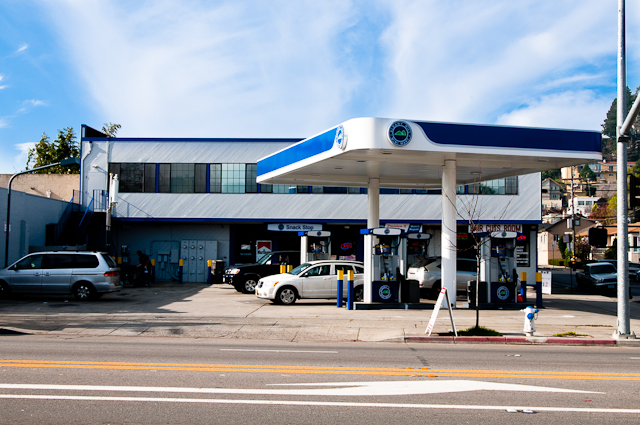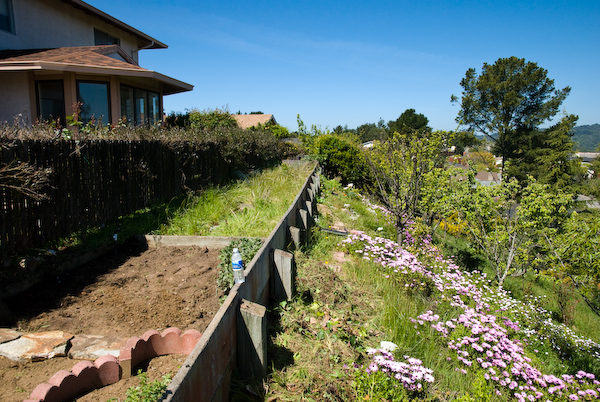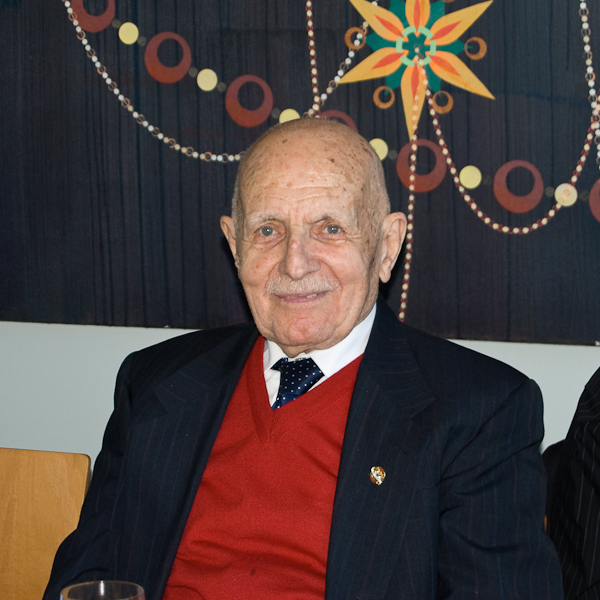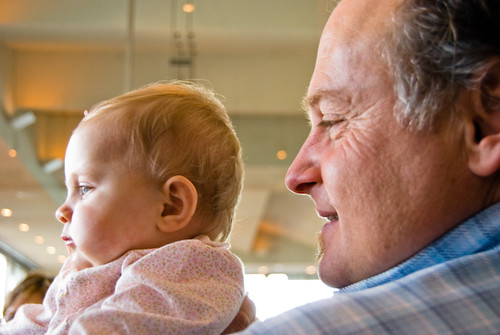Posts Tagged: panos
Albany Hill Mini Mart

Albany Hill Mini Mart / © Neo Serafimidis 2011
Photo of Albany Hill Mini Mart from my Albany Commercial Streetscapes project. I suppose it’s not really that exciting a shot, but I have a soft spot in my heart for it. It is kind of an homage, again, to Ed Ruscha, this time to his Twentysix Gasoline Stations book. Although it could be Shore or Wessel, too. But since the project as a whole turns out to be an echo of Ruscha’s Every Building on the Sunset Strip, I’ll just go with that.
In any case, looking at images from Twentysix Gasoline Stations online, I was reminded of something from my childhood: the gasoline station across the street from my Uncle Pete’s shoe repair shop. There were two things about that station that I never understood as a small child. The first was the brand name, which was Terrible Herbst. I didn’t even know that it was the name of anything because it was so strange, and I sure didn’t know how to pronounce the second word. I remember sitting in the shop looking out the window at the station, silently mouthing the words, trying to figure how to pronounce the name by trying to figure out what felt right in my mouth. I wasn’t used to seeing so many consonants in a row. Who knew it was a big regional brand, much less that it’s still around?
The second confusing thing to my feeble five-year-old mind were the signs next to each of the drive entrances. As I remember, they were three-foot-high metal signs on stands with springs so they would give a little in the wind. They were plain white and written in red letters were the words “GAS WAR!” I really did not know what that was supposed to mean. I knew what gas was, and what war was, but I couldn’t put the two together in any way that was meaningful to me. Even now, I have to suppose that “PRICE WAR” would be more intelligible. Despite being confused, I would feel the effect of reading the word ‘war’ as a tiny little adrenaline-like rush, because war was exciting. It made me want to be back at home playing with my army men.
Dang, I can still picture that station in my mind. I sure wish I had a photo of it. Besides being an interesting thing to have, it would help me sort out some of my foggy memory about it, because I seem to remember there being a winged horse, which is the old Mobil graphic, of course. I vaguely think the stations were next to each other. Here is a google streetview of where it/they once stood.
View Larger Map
Swivel the view around to the other side of the street and zoom in a bit to see the little white storefront building where Panos Shoe Repair was located once upon a time. There’s lots of memory there. But that’s a story for a different time.
And then there was one
My Uncle Pete died. They say it was kidney failure, but I’m not sure. I think it might have been exhaustion. So, now my mom is the only one left, the only one of the previous generation of our family left in America.
Peter Panos came to America in the 1950s. He came from Greece without knowing the language. He came crippled, with hip dysplasia that was never treated in his mountain village. He came with his wife and a three-year-old daughter, Aglaia, who had inherited this disease. He came believing he could help his daughter and make a better life for his family. And he did.
Greece had suffered. The village, the families, they all suffered. There was the depression, the Second World War, the Nazi occupation, then the civil war. There was rural life in the mountains of the Peloponnese, a region that had a long history of resistance, of the Ottoman Turks, and then of the Germans. A relative told me that the village of Arbouna prides itself that no Turk ever stepped foot in the village through all the years of occupation. I don’t know if that’s true or not, and it doesn’t really matter. Today the village is decimated, like so many others in Greece, by the great migration out of the countryside, out of the olive orchards and fields, out of the sheep and goat pastures, and into the big cities. And for some, into America. With the wars, Uncle Pete’s opportunity to continue his education and develop his love of classic literature ended. But he was smart as a whip, talked a thousand miles per hour, and was creative with his big strong hands. Eventually, he talked Sophia Vlahos into marrying him and going to America.
Uncle Pete knew how to repair shoes. He found himself in central California. He opened a shoe repair shop in Marysville. It burned in a fire. He bought land. It was a swindle. He opened another shop in Stockton. It didn’t work out. He always moved the family and tried again somewhere else. Uncle Pete met every adversity with renewed determination to overcome and to succeed. Energetic, driven, proud, and smart, he always figured out how to get through tough times and make the next opportunity happen. He also had a deep, fiery faith in the Orthodox Christian Church. He had faith that no matter what is thrown at him, Jesus Christ is with him and will support him. Eventually. he landed in Fresno. By then, there were three children. There was a boy with Down’s syndrome, and the golden child: a boy, strong, blonde, and blue-eyed. In Fresno, things seemed to head in a better direction.
Uncle Pete liked being in the middle of things, a trait he passed on to his son, Tommy. He loved introducing people to one another and easily made many friends. In 1960, he and his wife Sophia brought her sister out from Greece to help out. The 40-year-old spinster had had her own hard life in Greece, working as a housekeeper from the age of seven. The chance to go to America seemed worth taking. She came to work, but far from slaving away in her sister’s home, Efrosini Vlahos was soon married. Uncle Pete had a niece in San Francisco, Olga Rakos. She had a friend in Fresno, Maria Kalsoyas. And Maria knew Paul Serafimidis, 20 years Efrosini’s senior. By 1962, I was born.
To be honest, Uncle Pete was often a difficult person. It’s paradoxical because to anyone outside the family he was always perfectly charming, often deferential, and of course, generous. But with family it was often different. He could be controlling, and short tempered. He always wanted things his way. This always came from a conviction that he knew best, a desire to help, and an expectation of respect. Sometimes he was hard on Sophia and the kids. Too hard. He was also particularly hard on my mother, his sister-in-law. He teased her and they fought often. But they always made up, and the families always remained very, very close. I suspect a lot of what made him tick was growing up crippled in the highest mountain villages of the Peloponnese. In order to survive he was going to have to work ten times as hard and demand respect from people who might otherwise dismiss him. He did both of these things. He drove his children to succeed and supported them all the way. His little girl with his hips would graduate from UC Berkeley and eventually get her PhD, marry and give him grandchildren. His son Tommy would make it in the financial world of San Francisco. Along the way, a lot of support was needed. Uncle Pete provided it. He believed in them and pushed them. He scrimped and saved and managed to provide financial support seemingly beyond the means of a simple shoe repairman.
I remember some other things. Peter Panos was a master at grafting fruit trees. He always had a small orchard in the yard of any house they lived in, and there were always a couple trees growing four or five different fruit on the same tree. I remember how proud he was of buying new American style furniture, or adding a room onto the house on Griffith Way. I remember his cars, the Rambler, Valiant, and something big and brown from the 40’s. These were all symbols of having made it in America. I remember him driving my family to church every Sunday, since my father did not drive. Uncle Pete couldn’t understand that, but he always did this for us. I remember he was the cantor at church and had an extraordinary voice. I remember he liked to get where he was going early; we were always the first ones to arrive at church in the morning, or at the picnic grounds at Hume Lake. If we were driving to the Bay Area to visit Aglaia, you can bet we were on the road before the sun was in the sky.
There is much, much more to say, but I’ll stop for now. I’ll just say that I love you Uncle Pete, and I am going to miss you for a long, long time.
Urban Farming

“In Aglaia’s Garden 5”, originally uploaded by neocles.
Spring is definitely here, and this week I have earnestly begun plans for spring planting. The difference this year is that in addition to planting my own small garden, I have been talking with my cousin Aglaia about collaborating on a more ambitious garden at her place where she has lots of space. I have been looking into urban farming ideas and the possibility of growing enough to trade with other local “farmers”.
Aglaia’s place is on the ridge in the Oakland hills on an eastern facing slope. It’s a great spot overlooking Moraga and the hills. Right now there is a strip at the top for vegetables, and many fruit trees on the slope. I will get the details on what trees there are, but I know there are at least a couple quince, which I love. And they are pretty rare around here these days, so Bay Area foodies interested in making jam or trendy membrillo (quince paste) might want some.
There’s tons of clean-up and soil preparation to do, which we started on yesterday. Irrigation is in place but after some years of neglect, probably needs repair. We hope to have the first planting down the first week of May. We are definitely interested in sharing and trading. (Check out www.neighborhoodfruit.com) So, if anyone has recommendations on what to plant around here that people like but don’t already have tons of in their own gardens, let me know!
My Brother-Cousin
Tommy asked for forgiveness. Tommy Panos and I were first cousins; our mothers were sisters. Our families lived in the same city, Fresno, then on the same block, then right next door with a pass-through in the fence. Our families were close, and I am an only child, and so I always looked up to Tommy as my big brother. He was five years older than me.
I remember when I was about four years old, Tommy’s family would come visit ours on West Cornell Ave., and Tommy would push me around the block on my tricycle — me on the seat and Tommy standing on the step behind me, steering and pushing with the other leg as on a scooter. Typically, the ride started out fun, and then got exciting, then got thrilling, then got terrifying as Tommy jumped off and I frantically tried to steer until my trike slowed to a manageable speed. Then I was ready for another lap.
A few years later we both lived on Griffith Way. I would beg to hang around with him. Tommy would offer to hike me on his bike to go to the 7-11 to get candy or a slurpee. I would get on the handlebars of his Schwinn Varsity 10-speed. Tommy would take off and by half way down the block we would be moving pretty fast. That’s when he’d simply jump off the bike and see how far it would stay up with me on the handlebars before it went crashing over. He’d laugh hysterically, but then come and get me up and hug me, and then buy me some candy.
I would beg, beg, beg for him to take me on his paper route (Fresno Bee) with him. This meant he would hike me on the back of the heavy-duty Schwinn with the paper bags. I don’t know how he survived hiking me along with all those newspapers. Getting to go along meant helping too, and that was fine with me. He would ask for papers and I would pull them out and hand them to him as needed. We would always stop at the 7-11 and get black pepper beef jerky, some candy or a coke.
There was only one catch: Rover. The huge carmel-brown dog at the corner of Swift and College or so. I can’t remember if it was a hound or what. I just remember that Tom would miss that porch and I would be sent to go get the paper and put it on the porch. That meant facing Rover. That deep bark blew my hair back and set me to tears. Usually Rover was lying around right in front of the porch and I would start to inch my way toward the ivy to hunt for the paper, the dog bellowing at me the entire time. Tommy would laugh and laugh. Then, he’d buy me all kinds of treats at the 7-11. We’d sit around and he’d counsel me on bikes and cars and making paper airplanes, anything else that his quick mind conjured. Somehow, I never got bitten. I also never quit looking up to him, appreciating his spirit, sense of fun, and sheer coolness. But I never got over my fear of dogs. It was nice of Tommy to try to break me free of it. Sort of.
We told all these stories before, when Tommy was my best man. We laughed and laughed, and ate and drank, and laughed some more. By then, he had gone off to San Francisco and success selling bond investments. He still had his sense of fun and his need to share everything he found and everything he enjoyed with those around him.
Once when I was about 17, i went to the Bay Area for a concert, and, of course, my friend and I stayed with Tommy. When my friend left the next day, Tommy had insisted I stay the weekend to hang out with him and said he’d get me home. Sunday afternoon came and no arrangements had been made. Tommy called an agent and arranged to fly me back to Fresno. The next flight out of Oakland was in about an hour. We took off from his house in Orinda, drove insanely fast to the airport, and ran to the counter. He slapped the ticket in my hand, and gave me a push. I ran through the terminal and got to the plane with the hostess impatiently holding the door open for me, the last person to get on, for my very first plane flight ever.
There were many other firsts for me and Sarah with Tommy. And Tommy always insisted on paying for everything. Our first time dining at Fourth Street Bar and Grill in Berkeley, back before anything else was there at all; our first time at Zuni Cafe in San Francisco, and at the famous Stars, and innumerable other restaurants, bars and theaters. My first, and only, show at ACT to see Ma Rainey’s Black Bottom. And to the Bammies, and concerts, and to nightclubs here and gone. He took me on my first hike up to Cataract Falls on Mt Tam, and after the hike, straight to Frogs Spa for a soak and a massage. He loved food, and loved to cook, and the list of foods and dishes he introduced me to is endless.
Tommy had keen senses and became a connoisseur of everything in which he took an interest, from primitive art to jazz music. But more than that, he could not really enjoy anything unless he was sharing it with those whom he loved. One of the things he loved to share was people. He introduced so many people to each other, and gathered so many smart, interesting, and wonderful people around him, he was the hub of an incredible 360 degrees without separation. He was the most generous person I have ever known or ever will know. He wanted to do everything for everybody. He wanted to at least do something for each person he ever bumped into.
Somehow, in a way we will never understand, this desire consumed him. His most selfish act was to take himself away from this world and all those who love him so much, in order to escape the feeling that he had to be there for everyone.
Tommy. Honey. Brother. I love you. I miss you. I forgive you. I hope your wondrous spirit will continue to teach me and guide me.
Obit in sfgate.


You must be logged in to post a comment.